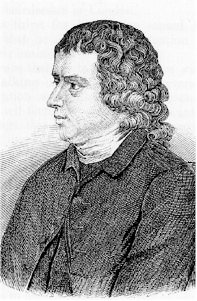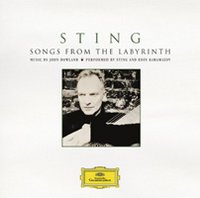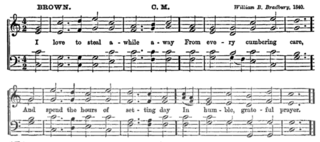Related Research Articles

John Dowland was an English Renaissance composer, lutenist, and singer. He is best known today for his melancholy songs such as "Come, heavy sleep", "Come again", "Flow my tears", "I saw my Lady weepe", "Now o now I needs must part" and "In darkness let me dwell". His instrumental music has undergone a major revival, and with the 20th century's early music revival, has been a continuing source of repertoire for lutenists and classical guitarists.
An air is a song-like vocal or instrumental composition. The term can also be applied to the interchangeable melodies of folk songs and ballads. It is a variant of the musical song form often referred to as aria.
"Tom o' Bedlam" is the title of an anonymous poem in the "mad song" genre, written in the voice of a homeless "Bedlamite". The poem was probably composed at the beginning of the 17th century. In How to Read and Why Harold Bloom called it "the greatest anonymous lyric in the [English] language."
John Coprario, also known as Giovanni Coprario or Coperario, was an English composer and viol player.
Robert Johnson was an English composer and lutenist of the late Tudor and early Jacobean eras. He is sometimes called "Robert Johnson II" to distinguish him from an earlier Scottish composer. Johnson worked with William Shakespeare providing music for some of his later plays.
"A Red, Red Rose" is a 1794 song in Scots by Robert Burns based on traditional sources. The song is also referred to by the title "(Oh) My Love is Like a Red, Red Rose" and is often published as a poem. Many composers have set Burns' lyric to music, but it gained worldwide popularity set to the traditional tune "Low Down in the Broom"
John Bennet was a composer of the English Madrigal School. Little is known for certain of Bennet's life, but his first collection of madrigals was published in 1599.

"O Sacred Head, Now Wounded" is a Christian Passion hymn based on a Latin text written during the Middle Ages. Paul Gerhardt wrote a German version which is known by its incipit, "O Haupt voll Blut und Wunden".

"Come Thou Fount of Every Blessing" is a Christian hymn written by the pastor and hymnodist Robert Robinson, who penned the words in the year 1758 at the age of 22.

Songs from the Labyrinth is the eighth studio album by British singer-songwriter Sting. On this album, he collaborates with Bosnian lutenist Edin Karamazov. The album features music by John Dowland (1563–1626), a lutenist and songwriter. It entered the UK Official Albums Chart at number 24 and reached number 25 on the Billboard 200. The release was a slow seller for a Sting album, his first since 1986's Bring on the Night to fail to break the UK top 10.
"Flow, my tears" is a lute song by the accomplished lutenist and composer John Dowland (1563–1626). Originally composed as an instrumental under the name "Lachrimae pavane" in 1596, it is Dowland's most famous ayre, and became his signature song, literally as well as metaphorically: he would occasionally sign his name "Jo: dolandi de Lachrimae".

Hodie is a cantata by Ralph Vaughan Williams. Composed between 1953 and 1954, it is the composer's last major choral-orchestral composition, and was premiered under his baton at Worcester Cathedral, as part of the Three Choirs Festival, on 8 September 1954. The piece is dedicated to Herbert Howells. The cantata, in 16 movements, is scored for chorus, boys' choir, organ and orchestra, and features tenor, baritone, and soprano soloists.
The Second Book of Songs is a book of songs composed by Renaissance composer John Dowland and published in London in 1600. He dedicated it to Lucy Russell, Countess of Bedford.

"Come Again, sweet love doth now invite" is a song by John Dowland. The lyrics are anonymous. The song is bitter-sweet, typical of Dowland who cultivated a melancholy style.

The Journey and the Labyrinth is a live music album performed by Sting and Edin Karamazov. It was released in 2007 by Deutsche Grammophon.
Now o Now I Needs Must Part is a song by the sixteenth-seventeenth-century composer John Dowland. The lyrics, a bittersweet contemplation of love and loss, are anonymous. The song was first published in Dowland's collection First Booke of Songes or Ayres of foure partes with Tableture for the Lute (1597).

"Can She Excuse My Wrongs" is a late 16th-century song by the English Renaissance composer John Dowland, the fifth song in his First Booke of Songes or Ayres. The words are set to a dance-tune, a galliard.

"Geh aus, mein Herz, und suche Freud" is a summer hymn with a text in German by the theologian Paul Gerhardt, written in 1653. It was first published in the same year in the fifth edition of Johann Crüger's hymnal, Praxis pietatis melica. The hymn was sung to several melodies, with the most popular one composed by August Harder. Later, it became a Volkslied in an abridged version.

"Vom Himmel hoch, da komm ich her" is a hymn text relating to the Nativity of Jesus, written by Martin Luther in 1534. The hymn is most often sung to the melody, Zahn No. 346, which first appeared in a 1539 songbook and was probably also composed by Luther. This classic Christmas carol remains popular and has inspired many choral and organ works by other composers.

"I love to steal awhile away" is a Christian hymn written by Phoebe Hinsdale Brown in 1818 in New Haven, Connecticut, U.S. It was Brown's habit to retire some distance from her house every day at a certain hour for meditation and prayer. The well-beaten path to the woods was discovered, and she was ridiculed by a thoughtless neighbor. "I love to steal awhile away" was written that night in tears, and later sung wherever the English language is spoken. The original version of the poem referenced Brown's domestic cares, but these were removed by the Rev. Asahel Nettleton in the published hymn.
References
- 1 2 Dowland, Robert (1610). A Musical Banquet.
- ↑ "Vocal settings of 'In darkness let me dwell'". LiederNet Archive. Retrieved 2015-04-21.
- ↑ English Madrigal Verse, 1588–1632, ed. Edmund Horace Fellowes, p. 384